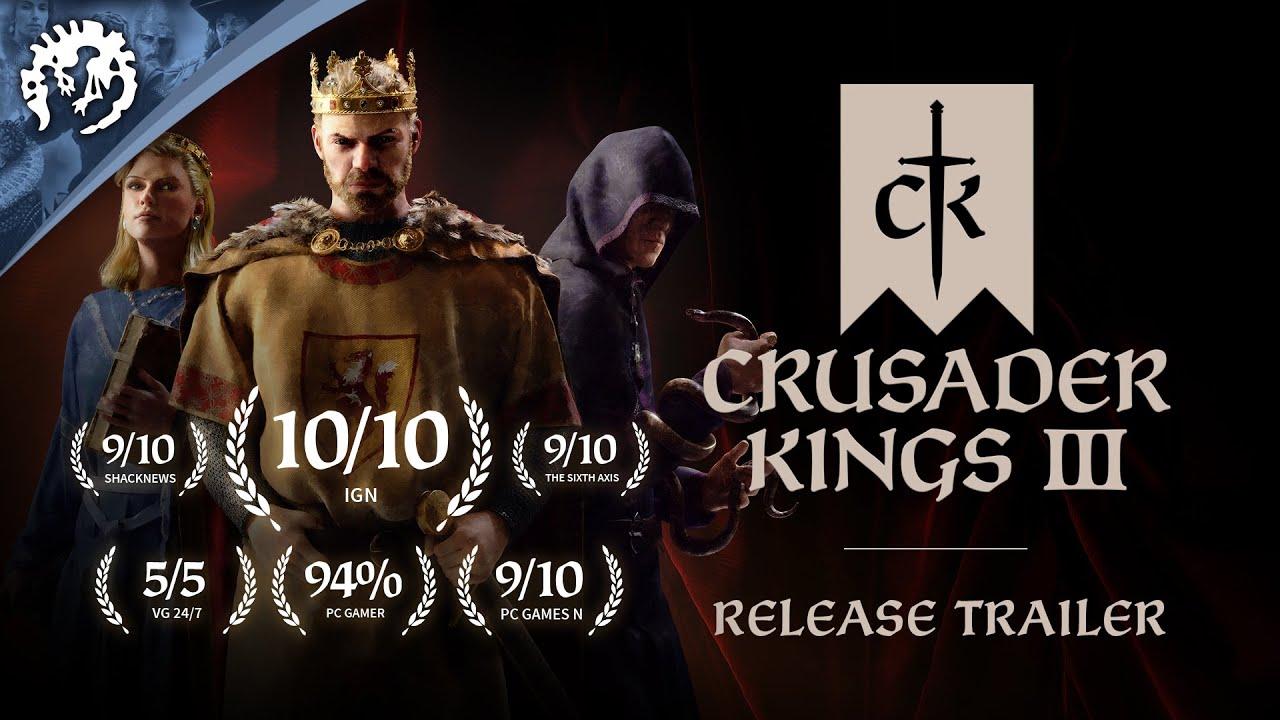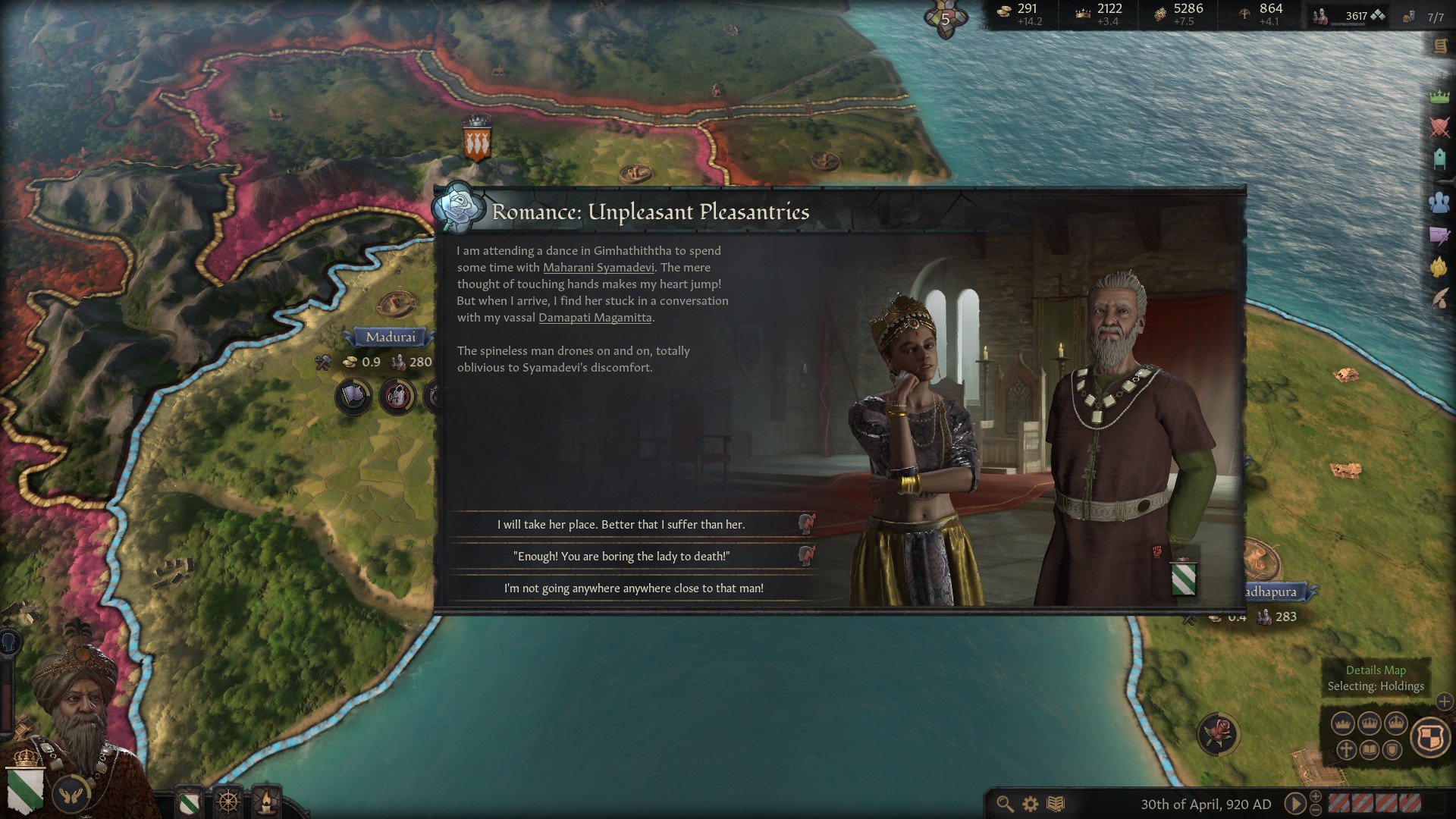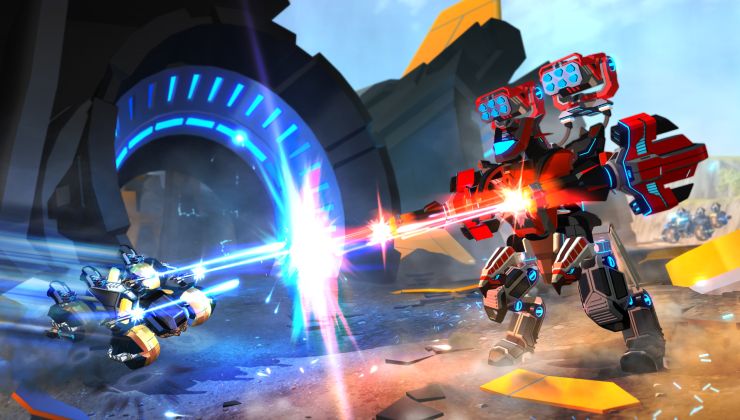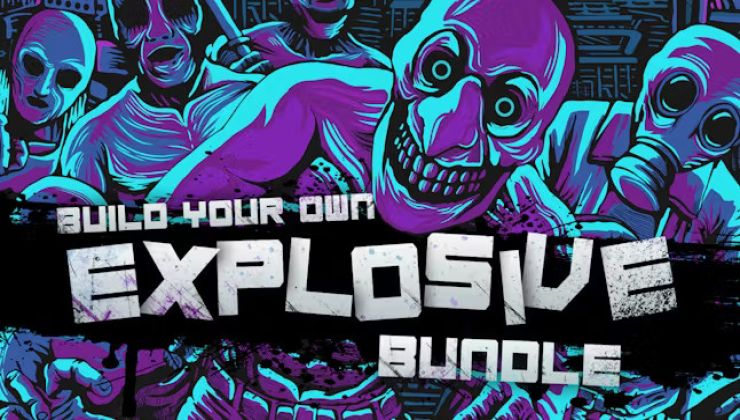Paradox Development Studios’ newest entry in the character-driven medieval strategy series has come out today. And, boy, is it ever good to be the king.

Direct Link
Crusader Kings III is a difficult game to describe succinctly. While a great deal of the game is about being a character, gameplay spans generations of rulers of your dynasty. Things like interpersonal disputes and interactions can have large administrative and strategic consequences. It’s possible to, through cunning and good marriages, come up from a lowly count to a great emperor in a generation or two. It’s also possible to be said emperor and be murdered by a scorned wife and have half of your realm rise up in revolt when your inbred son comes to power.
All of this takes place on a beautiful map that lovingly details terrain and kingdoms ranging from West Africa to Northern Europe, vast Russian steppes, the Middle East, and India and Tibet. Still images don’t really do the game justice—character models are fully 3d and are animated. These are vibrant and lively, reflecting their current lot in life at a glance. The level of detail is fantastic with banners fluttering from the parapets of castles or rivers lazily babbling around villages when zoomed in. Zooming out reveals the colors of the different realms before finally yielding to a faux-parchment map complete with fantastical beasts drawn in the water and margins.
I had originally planned to hold off in comparing the game to its predecessor so early on in the review but there’s an important difference between the two games that explains a lot about the kind of experience Crusader Kings III wants to be. The previous title originally launched with only feudal Christian lords as playable entities, adding mechanics and other playable configurations through expansions over an 8-year period. Its sequel, on the other hand, allows you to play as pretty much whomever you wish right off the bat; being a Buddhist in India, a viking raider, or a West African tribesman are as valid as that feudal lord.
It is because the game acknowledges all this freedom in its design that the underlying systems are coherent and universal. Now, if you’re a newer player it’s still all complex, perhaps to the point of being initially overwhelming, but I believe that it’s needfully so. To its credit, Paradox has made strides in easing players in with a comprehensive tutorial. Beyond that, the game has tooltips for just about anything and concepts that remain unclear can be looked up in an in-game encyclopedia at any moment.
Understanding the basics doesn’t take too long; exploring the game’s other systems can be done at leisure or according to taste. Focusing on intrigue and scheming is just as valid as diplomacy and conventional warfare. Characters spend their lives improving their skills according to the lifestyle chosen for them. This system, complete with skill trees, can result in tailor-made characters for your preferred play style.
It’s perfectly fine to play as a virtuous ruler, a dreaded tyrant or anything in between. Intimidating your vassals and courtiers can be just as effective as being the very model of chivalry. Some lifestyle perks feed into systems like stress, dread or respect, providing a powerful feedback so that you can rule as you like. The favors system—called hooks—adds to this and can compel vassals and courtiers to accept your demands. They can be gained by various means ranging from intrigue and blackmail or to simply being a good friend. These can be leveraged to change feudal contracts, keep characters out of faction and all sorts of other actions. It is a system more intuitive in action than it is to describe and also provides plenty of opportunity for players.
The real brilliance of the game comes in the form of its emergent storytelling. Events, rivalries and the decisions made by the player make for a rich narrative that can translate just as easily into a great holy war or the seduction of another ruler’s spouse. The game is good at prodding players at story lines of their own making without being overbearing—just as a small notification area might suggest fabricating a claim on a nearby county or placating an irascible vassal. Taking a look at how your character has a strong claim on a title might suddenly spawn a military adventure or a murder plot, each with its own ups and downs.
Political considerations often factor into any sort of decision. Like whether or not to marry a child or sibling off for an alliance with another realm instead of keeping them around to make use of their skills. Or when it comes to picking your steward or other council members—do you go for the most talented person available or for a vassal whose opinion is negative because you haven’t given them their rightful place at the council? And do you make those in your court into knights and risk their death in battle? Putting your heir on the front lines might jeopardize succession plans but, with a little luck, it could be just the ticket to getting rid of an ambitious rival.
Many of the quality-of-life additions from the previous entry have made it into CK III and have undergone further evolution. Things like rally points and retinues (now called men-at-arms), both introduced into CK II through expansions, are integrated into the base experience and have a higher degree of granularity. Councilor tasks, such as proselytizing, are now based on a progress bar instead of just probability. Even UI scaling, which was bolted-on late into CK II’s life cycle, yields better results this time around.
While I’m convinced this may well be Paradox’s most ambitious and polished release yet, it isn’t quite perfect. Aside from minor small issues, I found myself thinking more than once that I would have liked to have seen some truly unique events for the more exotic cultures and religions. But, honestly, given the amount of dynamic content that’s already in the game it’s a really minor gripe. Likewise, the stress system is also interesting—providing trade offs between acting against your character’s nature—but it’s usually a little too easy to avoid the more serious effects that occur at higher stress levels.
It’s perhaps because the good parts of the game are so well-crafted that it’s easy to forgive the small shortcomings—such as small UI annoyances like truces being hidden in a sub-menu instead of appearing on hover like everything else. If I had to nitpick some more, I’d also say that the soundtrack is a little too passive, a little too bland to leave much of an impression.
I could easily spend several hundred more words talking about those small moments that are simply so pleasing to experience. With enough dedication, a small religion can eventually be spread by your dynasty and reformed to your liking via the piety mechanics. Those large, stable empires can be dismantled systematically with persistence or goaded into calamitous civil war. I found great satisfaction in participating in a crusade in which my nephew was granted a kingdom thanks to my efforts. And it was likewise gratifying to raid into the Indian subcontinent with Tibetan pagans, along the way taking nudist captives and adopting their strange way of life.
It’s difficult to compete with a predecessor that was updated so frequently over such a long period. Still, Crusader Kings III manages to provide a new, stable foundation for the franchise while sacrificing very little in the way of content. It’s not all there but it never needed to be. The most important lessons were absorbed and learned.
With all of that said, this is still a game with a very real learning curve. I believe it’s the best entry in the series so far with plenty to love for new players and returning veterans. Having a little patience to understand the sundry subtleties is well worth it. In my experience the years of gameplay quickly become decades and centuries and, before I knew it, I was left with the stories of many a memorable reign.
You can pick up a copy of Crusader Kings III on Paradox Webshop, the Humble Store or Steam.
If you’re still on the fence, I streamed a few hours of gameplay recently that you might want to check out to appreciate the game in motion.
I'm looking forward very much to playing it eventually, but Paradox games have finally moved beyond my PC specifications. Well, it's not like I ever buy games on release anyway - I have way more patience than money
Hard pass if you want a game that is fully fleshed out and complete rather than largely empty and waiting for the inevitable billions of price-gouging DLCs to be jammed into the game later as Paradox LOVES to do.
What a horribly abusive and very annoying business model.
I whole heartedly disagree. I have every EU4 DLC and I can assure you that this is still the game where I spent the least amount of money per hour played. The model ensures that the game is continually improved upon and most of the improvements get into the base game free of charge. Usually only flavour goes into the DLC (at least during the last few years). So unless you want to support the developer you do not even have to buy the DLCs.
Even better, when you play multiplayer only the host needs the DLC. All others get the features that the host has no matter which DLC they own themselves.
I prefer this model very much compared to other games where you get a new installment every one to three years and everyone partaking in a multiplayer match needs the same DLC.
Is there any chance that it will be available DRM-Free, like on GOG, like some other recent Paradox games?From what I've noticed, Paradox waits until their games are a little aged before releasing on GOG... not ancient, but no longer hot and fresh. Kinda sucks, but fair enough.
Is there any chance that it will be available DRM-Free, like on GOG, like some other recent Paradox games?
First, Paradox games are DRM-free even on Steam - after downloading the game you can just copy the folder and do whatever you want with the files. You'll miss steam features like the workshop, of course, but it doesn't have restrictions as far as I know.
Second, I will speculate it is likely to come out on GOG, though perhaps may take a while. Paradox games used to be very dependent on Steam, but they have been trying to "fix" that recently and putting their games on a variety of stores.
Going into some more detail, their internal games starting with CK2 were only on Steam (CK2, EU4, HoI4, and Stellaris on release). But eventually they decided to use Stellaris (one of their most successful games) to test other options: they put it on GOG and also used it to test of their own store/app (so, for example, you can download Stellaris from Paradox Plaza directly, in addition to the steam key you get). At the same time they started building their own multiplayer system (with cross-play in mind), an experimental mod system (an alternative to the Steam workshop) and so on - but so far, their strategy has been one of publishing in every store they could, and not just their own. Their releases after that are all in GOG, I think. Imperator is, and I think most games from their other owned studios too: Battletech, Surviving Mars, Age of Wonders: Planetfall, etc (and of course all their old games, pre-CK2).
Of course I can't guarantee anything, but I would say that, from what we know of their strategy, it is very likely that the game will be released on GOG.
If you’re still on the fence....Steam and other store pages say the game has multiplayer. It is not described really. Can anyone explain? The style and depth of the game make me think it would require too much commitment for most circles of friends, or at least mine. When you're talking multiple play sessions to get through one "game," we never finish (looking at you, Stellaris! And Tropico 5 and...). So, I'm curious if there is a multiplayer mode that is like a lite version of the game or something like that. 'Cause if the multiplayer is the full, regular game, then I might as well just ignore that feature and treat it like a single-player game.
Trying to think of a solution instead of giving up, I suppose one could schedule game time on the calendar and make sure everyone could commit 2-3 hours to play, just like a board game night. At the end of the first session, schedule the next. Repeat until you complete a campaign. Heh, when a game requires that much "effort," it's a pretty serious game! Definitely not casual category. :)
Steam and other store pages say the game has multiplayer. It is not described really. Can anyone explain? [...]The multiplayer is, in fact, drop-in and you can open up your game for people to join at any time. It's just like the normal game, no "lite" version from what I can tell. That said the host can change the game rules beforehand for more/less randomness, things like faster/slower conversions, and a lot of other aspects of the game. Still going to be a big time investment to reach the "end" of the game, just like singleplayer
What a great review, BTRE. I was planning on holding off buying this due to the dog's dinner of Imperator Rome on release day, but your enthusiasm is breaking my resistance :)Personally, I found Imperator bland at launch and it didn't draw me in even though I really wanted to like it. I haven't really played with the latest round of updates, however. I was thinking of writing up thoughts on the current state of the game but I have to find the time for that.
There's just no comparison between Imperator at launch and CK3. CK3 is just so vastly superior; it has a coherent design vision, fun mechanics and is just so darned polished. Even after playing dozens of hours in order to review or stream it, I still am looking forward to playing more over the weekend
Last edited by BTRE on 2 Sep 2020 at 1:00 pm UTC
That said, I did have a couple of successes and the emergent narrative caused some good laughs already. Like when the spouse I chose for my son gave birth and it was revealed that not only is he not the father, but the actual father is in fact a very close relative of her. And that in a good Catholic family!
I'm still a bit torn between continuing the tutorial character or starting over as someone that suits me better, but I guess for the time being I might as well continue and see where all this will lead. And I'm really eager to take over as son and kick out the wife ;-).
Is there any chance that it will be available DRM-Free, like on GOG, like some other recent Paradox games?From what I've noticed, Paradox waits until their games are a little aged before releasing on GOG... not ancient, but no longer hot and fresh. Kinda sucks, but fair enough.
Yeah but Imperator: Rome was a day-one release on GOG too, if I'm not mistaken.
But I can wait a delay for the GOG release, I can deal with it.
I have read a few reviews, and I see nothing to convince me that CK3 is, at this point, a significant or meaningful upgrade from CK2 with its years of polish and expansion packs. Maybe in a few years, CK3 will offer more than what my version of CK2 offers now.As someone who hasn't played CK2 before, CK3 looks and sounds more appealing. Better graphics (yeah, they make a difference for me) and better learning it sounds like. CK2 is free on Steam, so I have access to it. I also have the Sons of Abraham and Sword of Islam expansions. Can't remember if I purchased those (?) or got them from a bundle. Is CK2 worth the time investment with that setup (if I close my eyes
Last edited by 14 on 3 Sep 2020 at 5:33 am UTC
I have read a few reviews, and I see nothing to convince me that CK3 is, at this point, a significant or meaningful upgrade from CK2 with its years of polish and expansion packs. Maybe in a few years, CK3 will offer more than what my version of CK2 offers now.
I had the exact same fear when they announced CK3. Worse than that, I even thought this was actually pretty bad news : from my perspective, CK2 with all DLCs was already (almost) perfect, and I was eagerly awaiting for Vicky 3.
But boy oh boy was I (almost entirely) wrong. So, from someone who put ~2300 hours into CK2+all DLCS and about 15 hours into CK3 :
What I almost don't miss :
- Governments : Nomads, Republics.
- Epidemics (with Covid I *think* the timing for that kind of feature might have been wrong).
- Secret societies.
- Horses / immortality / etc.
What I really miss :
- More specific events for cultures (did not see Blót or Holmgangs for vikings, nor chariot racing/greek fire for byzantines).
- DEATH SOUNDS.
- Viceroyalties (or an alternative system).
What I found awesome :
- Religion customization and what it holds for the future.
Overall, I don't think many things are missing to have a "complete" experience, but it's still noticeable for the hardcore CK2 player. You might wanna wait a few months to get it, but the game is already much more complete than CK2 in 2012. Can't wait to see what the future holds for this title.













 An idiots guide to setting up Minecraft on Steam Deck / SteamOS with controller support
An idiots guide to setting up Minecraft on Steam Deck / SteamOS with controller support How to install extra software, apps and games on SteamOS and Steam Deck
How to install extra software, apps and games on SteamOS and Steam Deck
Oh and the name doesn't mean anything but coincidentally could be pronounced as "Buttery" which suits me just fine.
See more from me